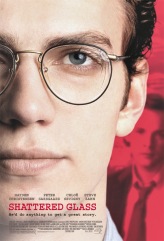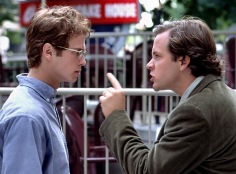|
Shattered Glass
|
| |
 |
USA, 2003. Rated PG-13. 96 minutes.
Cast:
Hayden Christensen, Peter Saarsgard, Hank Azaria, ChloŽ Sevigny, Steve
Zahn, Rosario Dawson, Melanie Lynskey, Cas Anvar, Ted Kotcheff
Writer: Billy Ray, based on the Vanity Fair article by Buzz
Bissinger
Original Music: Mychael Danna
Cinematography: Mandy Walker
Producers: Craig Baumgarten, Adam Merims, Gaye Hirsch, Tove Christensen
Director: Billy Ray
LINKS
|
 illing
itself as "the in-flight magazine of Air Force One," The New Republic
is known as one of the most influential public policy publications in the country,
particularly when Democrats are in power. For all that, The New Republic
is a remarkably unimpressive operation, operating on a shoestring budget and
with a surprisingly young staff. In May 1998, when Shattered Glass is
set, the average age of its fifteen writers and editors is only twenty-six.
illing
itself as "the in-flight magazine of Air Force One," The New Republic
is known as one of the most influential public policy publications in the country,
particularly when Democrats are in power. For all that, The New Republic
is a remarkably unimpressive operation, operating on a shoestring budget and
with a surprisingly young staff. In May 1998, when Shattered Glass is
set, the average age of its fifteen writers and editors is only twenty-six.
Shattered Glass introduces us to the youngest of these, star writer
Stephen Glass (Hayden Christensen), who would be eventually fired for inventing
all or part of twenty-seven articles out of the forty-one he wrote for the New
Republic. Glass's defining trait as a journalist is that he isn't one. His
advice on success has nothing to do with writing or reporting—it is to
be self-effacing around the office and solicitous toward your colleagues. It
works, too, though it is difficult to imagine a more fake human being than Glass
without perusing rosters of recent Presidential candidates.
Glass is a pathological liar. He rises to prominence with sensationalist pieces
like a story about illegal goings-on at a Young Republicans convention. His
articles, which contain as many factual inaccuracies as they do blatant invention,
somehow cruise through the fact-checking process, rolling over only the occasional
speed bump. It helps if you've greased the wheels with smarmy charm, and if
the articles are increasing circulation.
Stodgy Chuck Lane (Peter Saarsgard) is flustered by Glass's success, but Lane
is the choice to succeed well-liked editor-in-chief Michael Kelly (Hank Azaria)
when Kelly stands up to the boss one too many times. The staff, Glass most vocally
among them, grouse that Lane is a boring fact checker. Nonetheless, Glass is
in Lane's office first thing Monday morning, methodically kissing his butt.
Life continues as before until The New Republic runs a Glass piece called
"Hack Heaven," about a teenage computer hacker who extorts money from the company
he has been terrorizing. Reporters Adam Penenberg (Steve Zahn) and Andy Fox
(Rosario Dawson) of online publication Forbes Digital Tool become suspicious
and begin to investigate. They soon find the only fact in the article that checks
out is that Nevada is one of the fifty states.

Hayden Christensen and Peter Saarsgard face off in
Shattered Glass |
Back at The New Republic, Glass can do no wrong, and is particularly
idealized by Caitlin Avey, a composite character well played by ChloŽ Sevigny.
The other reporters are trying to "write funny" the way Glass does, because
"nobody wants policy pieces anymore." But when Forbes Digital Tool editor
Kambiz Foroohar (Cas Anvar) calls for information about Glass's sources, Glass
invents more lies to cover up his earlier ones. As a result, the increasingly
uncomfortable Lane has to find a balance between standing by his writers and
protecting the magazine's journalistic integrity.
This is not material that naturally lends itself to the cinematic medium, but
director Billy Ray has written a sharp script devoid of filler. With director
of photography Mandy Walker, Ray has plundered All the President's Men
to create a compelling look reminiscent, as they have put it, of a studio film
of the Seventies, and Mychael Danna's quiet but lively soundtrack keeps the
story in motion.
The mounting tension between Glass and Lane as Lane tries to determine the
extent of Glass's mendacity accounts for the best parts of Shattered Glass.
There is tangible conflict here personifying two journalistic ideals—the
entertainment-is-everything Glass versus the old-school Lane, who emerges as
the real hero of the film. Saarsgard also starred with Sevigny in Boys
Don't Cry as the terrifying John Lotter, and here he nails plain Lane
so thoroughly it is incredible that both characters are played by the same actor.
Christensen, on the other hand, although he is excellent in his scenes with
Saarsgard, lacks wider credibility as Glass. Whether the fault lies with the
actor or the character is hard to say. Ray's sources claim that Glass really
is as unctuous and fake as Christensen depicts him, making it difficult to believe
that anyone ever assigned him any credibility, or could even stand him for more
than two seconds.
In fact, it's bewildering that no one saw through Glass immediately, which
undermines the credibility of The New Republic as portrayed in Shattered
Glass. This myopia, concomitant with the young ages of all its writers,
makes it difficult to take the magazine seriously. Thus, the stakes don't seem
high enough to generate the tension necessary to make Shattered Glass
into a truly suspenseful journalism drama akin to All the President's Men.
Writer/director Billy Ray tells you what the stakes are for The New
Republic, but he never creates a concrete sense that something ominous is
happening. What we see in Shattered Glass is a kid that screws up and
gets caught, and an editor who becomes indignant about it.
Maybe we have become jaded by stories of reporters breaking the public trust,
most recently Jayson Blair of The New York Times. The line between journalism
and entertainment has all but disappeared, with prurient police investigations
and sordid court cases passed off as substantive news, and increasingly preposterous
scenarios on television foisted on us as "reality." Glass's story is symptomatic
of a profoundly dysfunctional collective state of mind, territory that this
film, for all its merits, leaves unmined. For that reason, Shattered Glass
functions as a dramatic character study, but not as the galvanizing wake-up
call about the sorry state of U.S. journalism that Ray says he wanted to make.
Review
© November 2003 by AboutFilm.Com and the author.
Images © 2003 Lions Gate Entertainment. All Rights Reserved.


